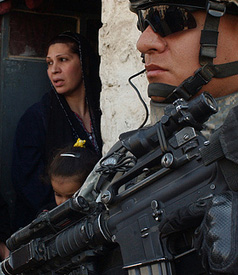“If I had one word to describe Iraq, I would just use the word ‘complicated.’ If I had two words to describe Iraq, they would be ‘very complicated,'” said Qubad Talabani, the representative of the Kurdistan Regional Government of Iraq to the United States .
Speaking to a group of journalists at a December 4 briefing, Talabani elaborated, “It’s complicated because of its history; because of the atrocities that have happened throughout Iraq’s history – to all of Iraq’s different communities. It’s complicated because Iraq itself right now is going through a transition of its own. It is transitioning from totalitarian dictatorship to some semblance of democracy and that in itself is a journey of its own.”
These circumstances are further complicated, according to Talabani, because Iraq has a “confused partner in the United States right now. A partner that has from 2003 up until now been heavily engaged in every aspect of political and military development of the country and a partner that is going through its own transition right now.”
Talabani suggested that not all of the region’s countries have provided the support that Iraq hopes for. “It gets even more complicated because it’s surrounded by interesting neighbors – it’s in a very interesting neighborhood who all have interests in how Iraq develops or doesn’t,” said Talabani, son of current Iraqi president, Jalal Talabani.
Talabani also pointed to a “‘culture of insecurity’ that has been bred throughout Iraq – because of its history, because of its present, because of its geographic location, because of its partners – that makes reaching political agreements on key outstanding issues” an extremely difficult enterprise and that insecurity is “at the heart of every political impasse right now.”
The result, he fears, “may be the appearance to analysts, to the press, to policy makers around the world that Iraqis are just unable to reach agreements, unable to make compromises.”
Eventually, according to Talabani, Iraqis will have a stronger national identity, but now “cling to the identity that they think will defend them.” An Iraq with multiple identities might be possible in the future, but we “are not starting from a clean and empty sheet of paper … The foundations that we are trying to build this new Iraq on right now are rotten.”
Suggesting that US and European expectations may be unreasonable, Talabani warned against the western impulse of “wishing that Iraqis would just be Iraqi,” eschewing other identities, 80 years of modern history and centuries before that.
Talabani said that for a Kurd to feel Iraqi is not just about having certain guarantees in the Constitution. It is not enough, and that time and “experience will make me, as a Kurd, feel comfortable in being an Iraqi.” For Talabani, “Getting these issues dealt with right is far more important that getting these issues dealt with quickly.”
This condition is exacerbated by too many external timetables from the US, UN, EU and the region, according to Talabani.
“Iraq cannot expect to turn from dictatorship to democracy in six or seven years,” said Talabani, but are looking for US direction. “In my opinion, the US should have an interest, must have an interest.”
“If it’s imperfect, let’s deal with it,” said Talabani.
Join us in defending the truth before it’s too late
The future of independent journalism is uncertain, and the consequences of losing it are too grave to ignore. To ensure Truthout remains safe, strong, and free, we need to raise $50,000 in the next 9 days. Every dollar raised goes directly toward the costs of producing news you can trust.
Please give what you can — because by supporting us with a tax-deductible donation, you’re not just preserving a source of news, you’re helping to safeguard what’s left of our democracy.
